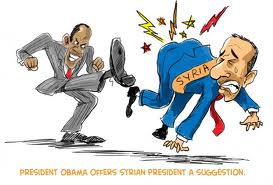 The United States appears to be out of answers on what to do with Syria.
The United States appears to be out of answers on what to do with Syria.
The Obama administration says it is not considering invading Syria or arming its rebels to remove President Bashar Assad from power. Diplomatic efforts at the U.N. have collapsed. A new, much-touted option of humanitarian assistance for Syria’s beleaguered population is a longshot — and would only bandage over the violence instead of stopping it.
For now, Washington is relying primarily on what it has been doing for the past 11 months in a so-far unsuccessful bid to force Assad’s government to end its bloody offensive on opponents: sanctions targeting the Syrian regime and isolating it from the world economy.
It is also borrowing somewhat from a strategy used in Libya’s civil war, assembling a group of like-minded nations, led by Arab governments, to coordinate an international strategy against Assad. The goal is to pressure the Syrian leader into accepting an Arab-proposed plan to transfer power to his vice president and allow for a transition to democracy.
“We are working with our partners again to ratchet up the pressure, ratchet up the isolation on Assad and his regime,” White House press secretary Jay Carney said Tuesday. “That pressure is having an impact. Ultimately, it needs to result in Assad ceasing the violence, stopping the brutality and allowing for a transition supported by the Syrian people.”
A senior EU official said Wednesday that the bloc will soon impose harsher sanctions against Syria, possibly including bans on the import of Syrian phosphates, on commercial flights between Syria and Europe, and on financial transactions with the country’s central bank. The official spoke on condition of anonymity in keeping with EU rules.
It’s unclear whether any of the U.S. strategies will produce the optimal result anytime soon.
Assad is receiving political backing from Russia and China, which delivered a double veto over the weekend of a U.N. resolution seeking his resignation. Russian Foreign Minister Sergey Lavrov, who met with Assad in Damascus on Tuesday, said Wednesday that both Assad’s regime and opposition forces were responsible for instigating the violence. Lavrov said Assad wants his vice president to hold talks with the opposition groups.
Sanctions may be crippling the Syrian economy but they have failed to impede security operations that have contributed to a death toll of more than 5,400 people since March. Syrian troops on Wednesday bombed residential neighborhoods in areas controlled by the rebels; activists said at least 50 people died in shelling of the central city of Homs. Assad’s military remains formidable, even if it is being increasingly challenged by the rebel Free Syrian Army.
The diplomatic and military stalemates are prompting some leading voices in Washington to propose more drastic measures to back Syria’s opposition, drawing parallels with America’s support for the Libyan rebels who chased Moammar Gadhafi from power last year.
“We should start considering … arming the opposition. The bloodletting has got to stop,” Sen. John McCain, R-Ariz., said. Sending weapons to Syria’s rebels is more difficult than in Libya because they don’t control a base as rebels there did in Benghazi, McCain said, but he insisted it should be done.
McCain spoke of coordinating any such action with U.S. ally Turkey, whose foreign minister is meeting with Secretary of State Hillary Rodham Clinton on Wednesday. Sen. Joe Lieberman, I-Conn., also urged assistance to the Free Syrian Army, which remains a ragtag band of isolated militia without command structure or sufficient means to truly threaten Assad’s grip on power.
Arming and supporting Syrian rebels in a proxy effort to oust Assad is a risky proposition. The threat of an all-out civil war might prompt Syria’s benefactors, from Russia to Iran, to lend greater military assistance and separate Syria’s Sunni-led opposition from minorities that could then cling more tightly to Assad. This type of division would play into Assad’s hands, U.S. officials have warned for months, and may only create an even more bloody and prolonged conflict.
Such a conflict also would raise pressure on the U.S. for military involvement in a part of the world where it just has extracted itself from eight years of war in Iraq. It also is still mired in a war in Afghanistan.
The administration rejected the call to arm the rebels.
WT

Leave a Reply
You must be logged in to post a comment.